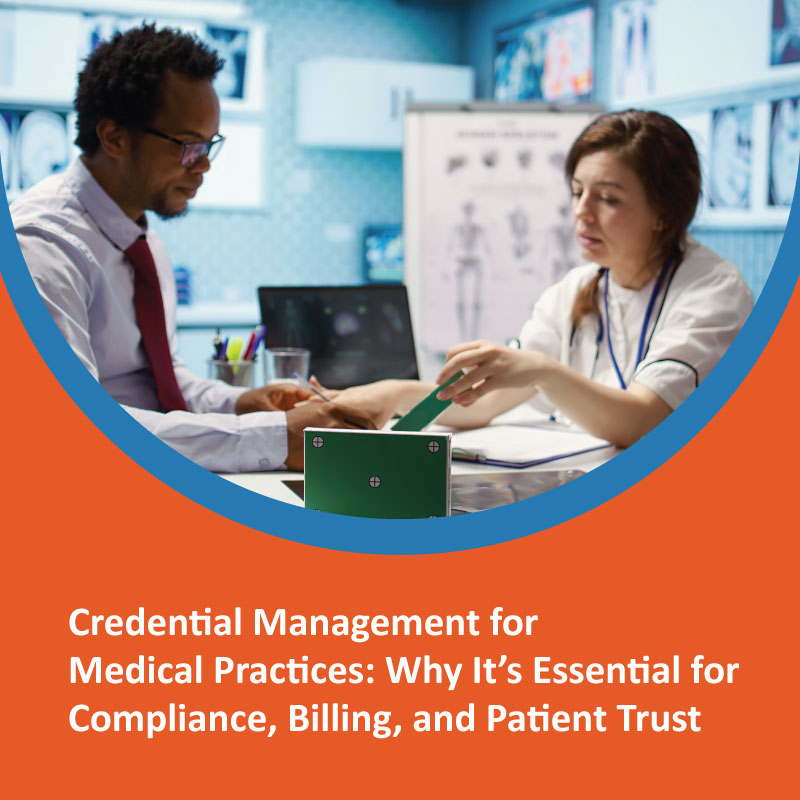Credential Management for Medical Practices
Credentialing management is the process of maintaining records for all service providers’ documents. These documents show the qualifications of doctors and nurses to practice medicine or nursing. These documents include their licenses, certificates, education, and job history. Credentialing these documents ensures that you can work legally and safely without any problem. It is also necessary to obtain approval from insurance companies. To perform a practice correctly it is essential.
Credentialing management is essential because it ensures that medical staff are legally approved to treat patients. When they are credentialed, they will receive payment on time from insurance companies. Without it, you can face delays or rejection of payments. The significant loss will be the erosion of patient trust.
This article explains in simple terms what credentialing management for medical practices entails. It also includes the section on why it matters most. So, connect with us for more details about this.
You may read: Best Medical Credentialing Software for Clinics and Hospitals in 2025
What Is Credential Management for Medical Practices?
Credential management involves maintaining records of all documents that demonstrate a provider’s qualifications and credentials. This includes licenses, certificates, degrees, and training records. It also means verifying that those documents are genuine and up-to-date. Clinics need this to follow rules and protect patients. It helps ensure that only trained individuals provide care.
These credentials include education, job history, and special medical licenses. Each one proves the provider is allowed to work. Keeping them updated avoids legal or billing problems. It also helps the clinic maintain its trustworthiness and organization. That’s why credential management is so important in healthcare.
Why Credential Management for Medical Practices Is So Important
It helps clinics operate safely, adhere to regulations, and receive payments on time. Here are some points why it is so important.
Legal and regulatory compliance:
Clinics must follow the health regulations established by law. Keeping provider documents up to date helps avoid problems and penalties.
Insurance network participation:
Providers need valid credentials to join insurance panels. Without them, insurance companies may reject or delay approval.
Protecting the practice’s financial health:
Incorrect or missing credentials can lead to denied payments. This can hurt the clinic’s income and cash flow.
Building and maintaining patient trust:
When doctors are appropriately credentialed, their patients will feel safely in their company. It means proper credentialing builds patients’ trust.
Common Problems in Credential Management for Medical Practices
Many clinics face challenges that make it difficult to keep credentials organized and up to date.
Missing documents:
If your license or any vital document gets lost, it will affect your approval for revenue or payment for your service.
Overlooked renewal deadlines:
Clinics may forget to renew documents on time, which can cause big problems.
Delays in insurance approvals:
If credentials are not complete, insurance companies may take longer to approve providers.
Staff shortages or overload:
Busy or small teams may not have enough time to handle credentialing properly.
Benefits of Strong Credential Management for Medical Practices
Effective credential management helps your clinic run more efficiently and grow more quickly.
Faster Approvals:
When documents are complete and up to date, insurance companies approve providers more quickly.
Less Office Stress:
A clear system means fewer mistakes, less confusion, and smoother daily work for the staff.
More Patient Access:
Being in more insurance networks allows your clinic to treat more patients.
Fewer Delays:
With everything in order, fewer problems interrupt daily work or patient care.
What Happens If Credential Management Is Ignored?
Failing to manage credentials can lead to significant issues for any medical practice.
Denied Claims:
Insurance companies may reject payments if provider documents are missing or expired.
Provider Suspension:
A doctor may not be allowed to see patients until their credentials are verified.
Fines or Legal Trouble:
Not following healthcare rules can lead to penalties or even legal action.
Reputation Damage:
Patients may lose trust if they learn their provider isn’t properly approved or qualified.
Conclusion:
Credential management for medical practice is essential. It keeps your practice legal and safe. It helps in avoiding problems that you could face with insurance and payments. When doctors are fully credentialed, they can perform their practice legally and with confidence. This helps in building the trust of patients. In this case, if you are running a clinic, you should not wait more and get credentialed today with the most trusted company, MedICD. A well-organized and trusted company for your medical practice can save your precious time. It can save you from payment delays and provide you with peace of mind. An effective system provides benefits for both the service provider and its patient.
FAQs
Q1. What exactly is credential management for medical practices?
It means keeping track of documents that show a doctor or nurse is qualified. These include licenses, certificates, and work history.
Q2. Why is credential management so important in a medical clinic?
It helps the clinic follow health rules and get paid by insurance. It also keeps patients safe and builds trust.
Q3. How often do credentials need to be updated or renewed?
Most licenses and certificates need to be renewed every 1 to 3 years. Each one has its own deadline.
Q4. Can small medical practices manage credentialing on their own?
Yes, if they stay organized and set reminders. A simple checklist and clear system can help a lot.


